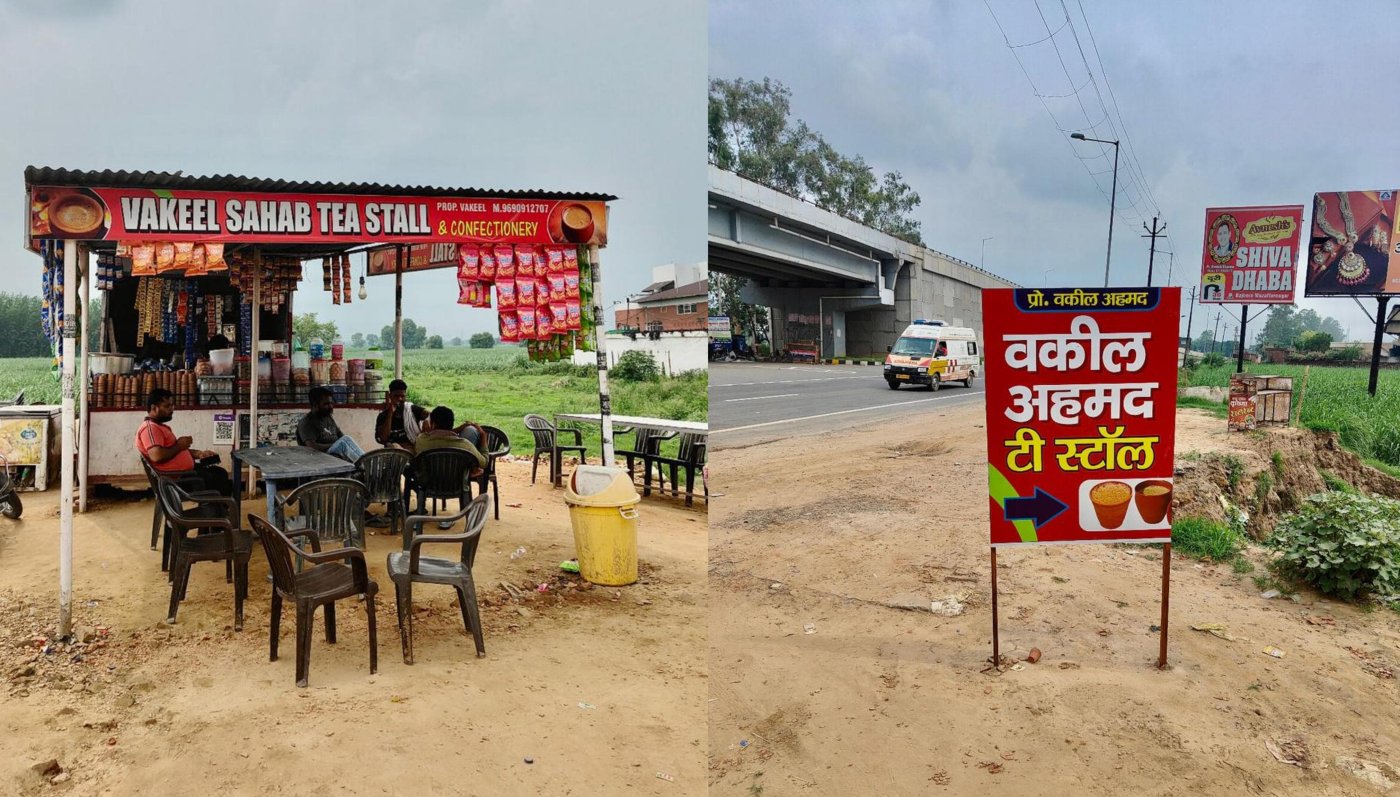Muzaffarnagar, Uttar Pradesh: For over two decades, 42-year-old Mohammad Azeem peacefully ran his small streetside paan and cigarette shop at the Vehelna Chowk in Muzaffarnagar, a communally sensitive district in the sugarcane belt of western Uttar Pradesh (UP).
Azeem said this changed on 9 July 2024 when the UP police came to his shop and told him to display his name during the Kanwar yatra, a pilgrimage in which millions of young Hindu men walk hundreds of kilometres from different parts of north India to the holy city of Haridwar in Uttarakhand during the monsoon season.
An estimated 25 million Hindu pilgrims pass through UP, India’s most populous state, governed since 2017 by the Bharatiya Janata Party (BJP), which has encouraged and facilitated louder, brasher and more jingoistic celebrations of Hindu festivals.
The day after the police visited him, Azeem paid Rs 1,200 for a new banner with his name.
In years past, Azeem said that his shop was filled with Hindu pilgrims buying tobacco and eating paan (nuts and natural sweeteners in a betel leaf.)
With his Muslim name displayed on his shop, Azeem was afraid that Hindu pilgrims might think twice about stopping and he would lose money during the yatra from 22 July 2024 to 6 August 2024.
“People might see my name and stop buying from my shop,” said Azeem. “I also fear that if any riots or communal conflict occur, it will be easy to target Muslim shops.”
On 22 July 2024, in response to petitions filed by human rights activists, the Supreme Court passed a stay order against the UP government directive that owners of hotels, food shops and roadside eateries (dhabas) in Muzaffarnagar should display their names.
A division bench of Justices Hrishikesh Roy and SVN Bhatti said that food vendors should only specify what food items they sell.
“We deem it appropriate to pass an interim order prohibiting the enforcement of the impugned directives. In other words, the food sellers (including dhaba owners, restaurants, food and vegetable sellers, hawkers, etc.) may be required to display the kind of food that they are serving to the kanwariyas. But they must not be forced to display the name/identity of the owners and the employees deployed in their respective establishments,” the court ordered.
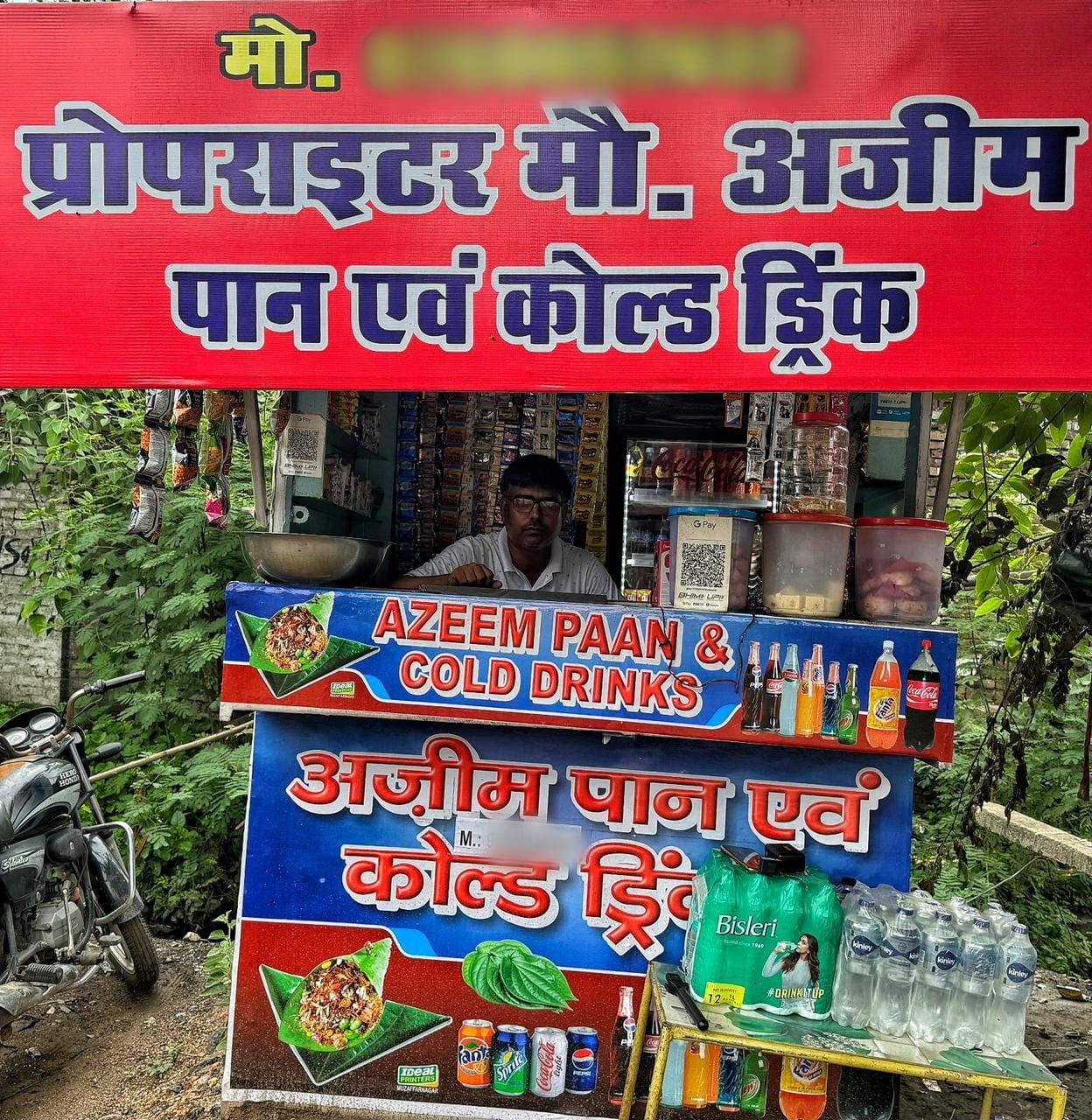
What The Police Said
The controversy blew up on 17 July when the UP police issued the directive on Twitter, sparking allegations of “apartheid” and religious profiling by opposition leaders.
The directive said in Hindi that during the holy month of Sawan, many people, especially Kanwariyas, abstain from certain food items, and confusion due to the names of eateries has led to law-and-order situations in the past.
“To prevent such recurrences and given the faith of the devotees,” the directive said, “hotels, dhabas, and shopkeepers selling food items on Kanwar Marg have been requested to display the names of their owners and employees voluntarily.”
“The intention of this order is not to create any kind of religious discrimination but solely to provide convenience to the devotees passing through Muzaffarnagar district, counter allegations, and maintain law and order. This system has also been prevalent in the past,” it said.
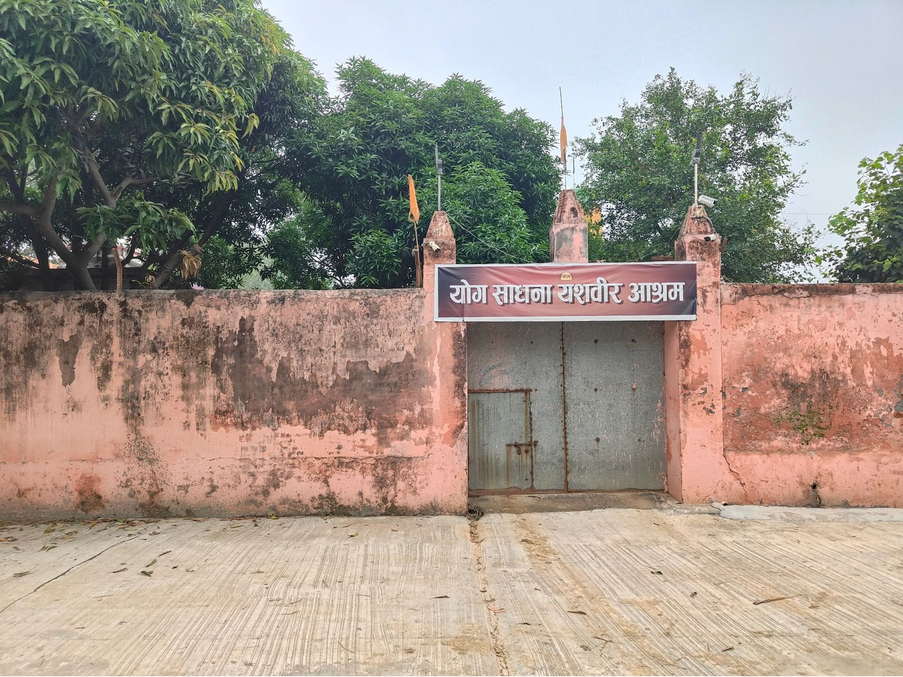
The UP government directive came after a year-long campaign by a Muzaffarnagar-based Hindu cleric, Swami Yashveer, to remove Muslim employees during the Kanwar yatra. When we visited his ashram, the gate was locked, and he declined to speak with us from behind it.
Since 9 July, Hindu extremists have pushed multiple pictures, caricatures, and unrelated videos to push the hateful conspiracy of thook (spit) jihad—Muslims spitting on food to defile Hindu purity and spread disease.
The police in Haridwar, Uttarakhand, and the municipality in the holy city of Ujjain, Madhya Pradesh, issued similar orders.
After the UP government's order, Haridwar’s superintendent of police (SSP), Padmendra Dobal, on 19 July, told the media, “We have ordered eateries to write their owners' names, failing which we will take legal action against them…A dispute often arises; hence, we have taken this decision."
On 21 July, the municipal corporation in the western district of Ujjain in MP ordered food shops and eateries to display names and numbers.
Ujjain mayor Mukesh Tatwal said first-time violators will pay 2000 rupees, and repeat offenders will pay 5000 rupees.
“Ujjain is a religious and holy city. People come here with religious aastha (faith). They have the right to know about the shopkeeper whose services they are availing. If a customer is dissatisfied or cheated, knowing the shopkeeper's details allows them to seek redress," Tatwal said.
The Supreme Court has issued notices to the governments of Uttar Pradesh, Uttarakhand, Madhya Pradesh, and Delhi, seeking their responses by 26 July 2024.
‘A Form Of Untouchability’
Supreme Court advocate Shahrukh Alam said that since directions resulted in an explicit breach of rights, the police had to show under what authority they were issuing the order.
“It is not sufficient to say that it is being done to prevent law and order since it takes illegal demands of some to ridiculous limits in the garb of preventing law and order issues,” said Alam.
“The argument that it is merely trying to make pilgrims aware of the vendor's identity (as opposed to their menus) is a form of untouchability that the State is instituting,” she said.
Alam said the directive violated Articles 15, 17, 19(1)(g) and 21 (violation of rights of privacy, life and dignity) of the Constitution.
Article 15—prohibition of discrimination on the grounds of religion, race, caste, sex or place of birth, Article 17—abolition of untouchability, Article 19 ( 1) (g)—right to practice any profession or to carry on any occupation, trade or business to all citizens, Article 21—protection of life and personal liberty.
“Even if the police had the authority to pass such overbroad directions— which it doesn't—this directive would fail the test of Article 14 (equality before law). It is arbitrary and overbroad.”
On 20 July, members of the civil society and Mahua Moitra, a member of Parliament from the Trinamool Congress, filed a petition in the Supreme Court to intervene and declare the orders unlawful.
One of the petitioners, Aakar Patel, who led the India chapter of Amnesty International before it was forced to close after the BJP government froze its bank accounts in 2020, said that the UP government order was unconstitutional and that it was intended to target minorities.
“This idea behind writing names on shops is to make sure that one community is boycotted, which is Muslims,” said Patel. “As a civilised country, we should not stand for it.”
After public outrage and protests by the opposition, the police said that they didn't force any specific community to write names and that the order was a “voluntary advisory”.
Responding to the UP police’s claim that the order was voluntary, Aakar Patel said, “In a state (UP) where people can get killed in police custody despite seeking protection from the Supreme court, cops knocking at your door and telling you to do something can never be voluntary.”
Adil, the 31-year-old owner of an 18-year-old family “pure-veg” dhaba, said that the police came daily from 9 to 19 July to check if his name was still displayed on the banner outside.
"The police threatened me to display my name on the banner," Adil said.
Article 14 sought comment from Muzaffaranagar senior superintendent of police Abhishek Singh on allegations of police coercing shops to display names and put Muslim employees on leave during the kanwar yatra. Singh said his statement was available on Twitter, and he would not take any further questions.
‘They Asked Only Muslims…’
When visited Muzaffarnagar on 19 July, three days before the Supreme Court stayed the directive, we found the order had been strictly implemented over the past two weeks but not equally.
In Vehelna Chowk, it seemed that only Muslim food vendors displayed their names.
While Azeem said the police ordered him to display his name, Rahul, an 18-year-old Hindu man who runs a vegetarian food cart next to Azeem's shop, said the police did not give him the same order.
"Why would they ask me to mention my name? Everybody knows me. Everybody knows my address," he said.
The same trend was visible in Shastri Market, Muzaffarnagar's main market.
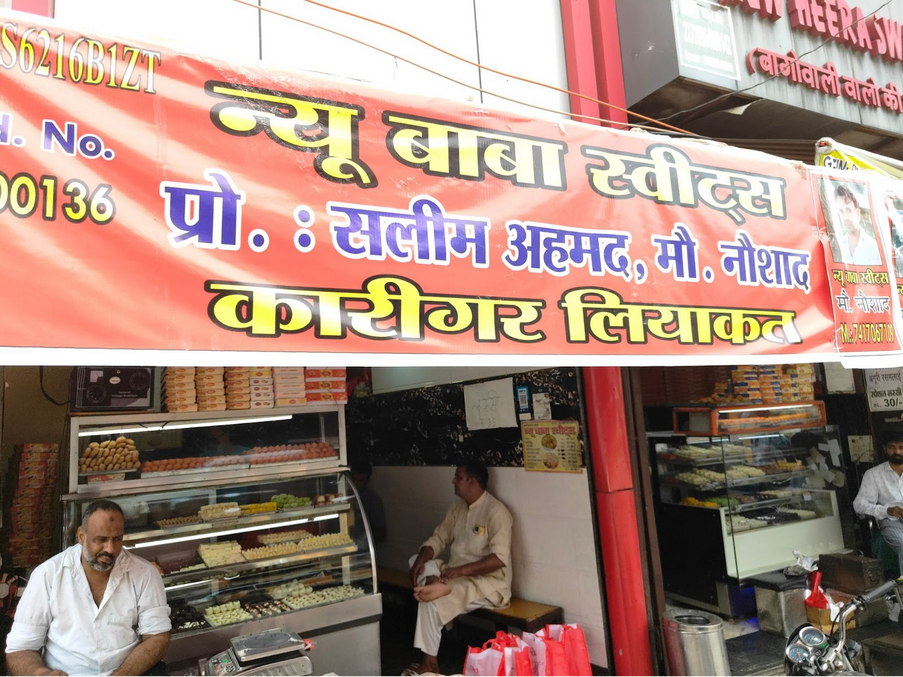
"They ordered only Muslim restaurateurs to display their names," said Salim Ahmed, 45, who runs a 70-year-old family sweet shop, New Baba Sweets in Shastri Market.
Salim said that Hindu customers stopped coming to his shop since the COVID-19 pandemic when Hindu extremists, BJP leaders, and TV channels blamed Muslims for spreading the virus—waging “CORONA Jihad”— calling for their boycott.
A study published by the fact-checking website BOOM examined 178 fact checks on COVID-19-related misinformation from January to May 2020. The study revealed that 35% of false claims targeted Muslim vendors, alleging they were spitting on food items to spread the coronavirus pandemic.
On 22 August 2022, the Bombay High Court, in its judgement quashing the FIRs filed against 29 foreign nationals of Muslim congregation blamed for the outbreak, said, "A political government tries to find a scapegoat when there is a pandemic or calamity, and the circumstances show there is a probability that these foreigners were chosen to make them scapegoats."
"There was a lot of propaganda in print media and electronic media against these foreigners who had come to Markaz... and an attempt was made to create a picture that these foreigners were responsible for spreading the COVID-19 virus in India. There was virtually persecution against these foreigners,” the court said.
Not Like Halal Certification
Some Hindu commentators and influencers compared this exercise by the UP police with Halal certification—a guarantee that food, pharmaceutical, and cosmetic products are manufactured as per Islamic law and are permissible to be consumed by Muslims.
Shahrukh Alam said that this comparison with halal certification was flawed.
“Halal certification marks food and not people, which this endeavour seeks to do. Halal certification is similar to hotels identified as "Hindu or Satvik or ‘pure vegetarian hotels'. It describes food, not who has cooked or handled it. This action focuses solely on the religious identity of the cook or server,” she said.
Alam argued that in the name of law and order, the police are pushing the “dangerous agenda of exclusion and untouchability.”
“If someone has a problem with me, then why should my right to privacy be violated and I get humiliated to maintain peace,” she added.
Becoming ‘Vakeel Ahmad Tea Stall’
Vakeel Ahmed, a Muslim tea shop owner on National Highway 58, told Article 14 that he felt singled out because of his religion when the police came to his shop and asked him to display his name.
Ahmed, 30, changed "Tea Lovers Point" to "Vakeel Sahab Tea Stall."
"The police came again and asked us to ‘make our religion clear’," Vakeel's brother, Faheem Ahmed, said.
Then, they changed it to “Vakeel Ahmed Tea Stall.”
The first banner cost him Rs 1,200, but when the police asked him to display his full name, Ahmed said he had to install another board outside his shop. It cost him Rs 2,300, so he ended up paying Rs 3,500.
“This money is a lot, but we have no option left,” said Ahmed.
"During the Kanwar days, our business used to double,” he said. “But this year, since our name is displayed, we feel scared and will close our shop for ten days."
Orders To Leave
Article 14 spoke with five dhaba owners in Khatauli City in Muzaffarnagar—three Hindus and two Muslims—who said the police pressured them to send Muslim servers and cooks on leave for the duration of the pilgrimage.
A Muslim “pure-veg” dhaba owner who runs a 50-year-old family business said on the condition of anonymity that the police came on 9 July 2024 and asked him to display his name.
"The police threatened me that if I don't display my name, they will take me to the police station," he said."The police asked me to send the Muslim staff on leave during the Kanwar days.”
The Muslim manager of a bigger “pure veg” dhaba on the other side of the road, who requested anonymity, said that the police came on 9 July 2024 and told him to send Muslim employees on leave during the Kanwar days.
"We won't send them on leave," he said.
At Shiva Dhaba, a pure-veg restaurant, whose 66-year-old owner and sugarcane farmer, Bishambhar Singh, said that he sent two Muslim employees on leave for 20 days when the police told him to do so.
One Muslim employee was the manager, and the other parked vehicles.
"There is nothing wrong with this (shops displaying owner names). I have seen with my own eyes that people at non-veg dhabas use spit while packing rotis. They must be Muslims. Now you tell me, will you eat at such a restaurant?" said Singh.
When it was pointed out that he employed Muslims, Singh said that his Muslim employees “were not like that”.
On why he sent them on leave if they “were not like that”, Singh replied, “We have to give them leave for monsoon.”
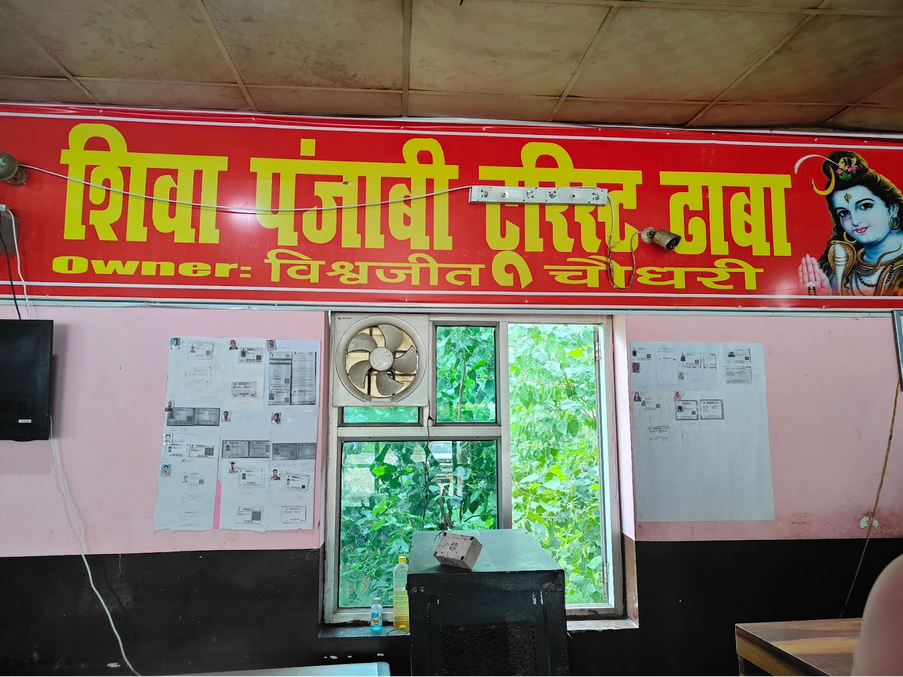
Anil Kumar, the Hindu cook at Shiva Punjabi Tourist Dhaba, said he took over his Muslim manager's job after the police visit on 9 July, telling the Hindu owner to send the Muslim employee on leave.
The dhaba owner is Vishwajeet Chaudhary, who said he was the brother of Raju Allahabadi, a BJP leader in Muzaffarnagar.
"The police came again the next day to check if we had sent Inam on leave," Kumar said.
After the police visited, Chaudhary decided that the dhaba would display the Aadhaar cards of all employees on its wall.
"This is to assure people that we don't have any Muslim employees," Kumar said.
At another dhaba, Sakshi Dhaba, one server said that all the Muslim employees had been sent on leave. "No comments," said the manager.
(Kaushik Raj is a freelance journalist based in Delhi. Alishan Jafri is a freelance journalist based in Delhi.)
Get exclusive access to new databases, expert analyses, weekly newsletters, book excerpts and new ideas on democracy, law and society in India. Subscribe to Article 14.

